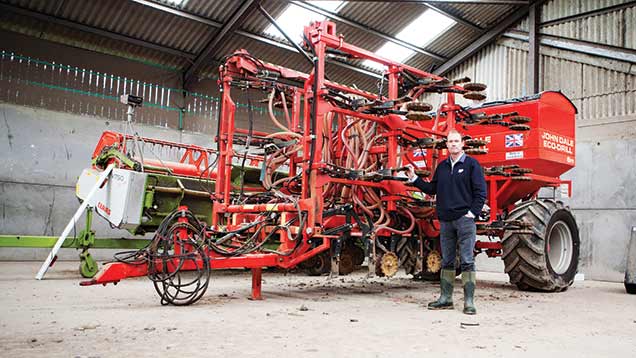Farmer Focus: Propino goes in as field work begins
 Andy Barr ©Alexandra Joseph
Andy Barr ©Alexandra Joseph Hooray, field work is under way again, kicking off with some Propino spring barley drilling.
We applied variable-rate phosphate as DAP pre-drilling so the tined drill worked it in a little and avoided it being trapped on the surface in our direct-drill system.
Ideally I thought I’d like a drill that can apply these variable fertiliser rates while planting.
See also: Read more from our Arable Farmer Focus writers
However I’ve just attended my first truly independent meeting on precision farming and, although all this variable-rate business makes perfect sense, it does seem the benefits are sometimes hard to pin down.
Having said this, one area where I feel we have seen an advantage with this approach is in fields with chalky outcrops.
However, while our tined drill mostly works well into grazed cover crops, sometimes there is still too much residue for it and I have gone halves on an old disc direct drill to try and cope with this situation and just generally experiment.
Some of my other (statistically meaningless) trials from last year showed no difference in yield between a disc direct drill and a tined one.
There was an increase in yield from mixing wheat varieties but not oilseed rape varieties, and no help from post-flowering oilseed rape nutrition.
Unfortunately, the latter two were contrary to the previous year’s experiences.
So many variables and so much hindsight. At this rate I’m going to have to rely on my own judgement from year to year… oh dear.
I had a fascinating afternoon last week courtesy of the Rothamsted Research Association.
I have sat in many meetings where everyone agrees that the balance of agricultural research needs to be shifted towards the applied end, but I often wonder if any action is being taken. So the attitude of the new Rothamsted director and the subsequent talks were a breath of spring air.
We heard about the machine that can identify sclerotinia spores in the field and text a warning, technology to detect septoria before it becomes visible on the leaf and the intriguing ability of forage rape to trap cabbage stem flea and pollen beetles.
Andy Barr
Andy Barr farms 630ha on a mixed family farm in Kent, including 430ha mainly of winter wheat, oilseed rape and spring barley. The rest is in an OELS scheme and grazing for 500 Romney ewes and 40 Sussex cattle.

